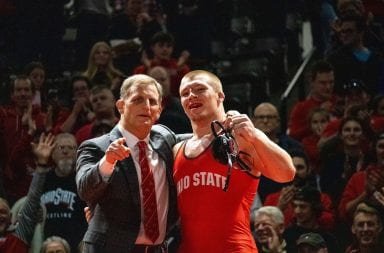
On March 7, Ohio State’s 2023 Outreach and Engagement Awards were announced, awarding 11 Ohio State faculty and staff. Credit Zachary Rilley | Photo Editor
Ohio State highlights the work of its faculty and staff, recognizing their contributions to the community. This year, 11 of them received recognition for their impact.
Ohio State announced its 2023 Outreach and Engagement Awards March 7 via its Outreach and Engagement website. According to the site, the awards are open to individual faculty members, staff and students, as well as outreach programs as entities themselves. Applicants can either nominate themselves or be nominated by fellow faculty and staff for one of four different awards: the Community Engaged Scholar Award, Community Partnership Award, Community Engaged Practitioner Award and High Impact Program Award, according to the website.
Assistant Vice Provost of External Engagement Nicole Nieto said the awards give “an opportunity for us to really honor” those in the community.
According to the Outreach and Engagement website, the Community Engaged Scholar Award is given to “faculty members who have demonstrated co-created engaged scholarship that has positively impacted communities.”
Four professors — Scott Graves, Nyama McCarthy-Brown, Susan Melsop, and Timothy McDermott — received the Community Engaged Scholar Award, representing the College of Education and Human Ecology, Department of Dance, Department of Design and College of Food, Agricultural, and Environmental Sciences, respectively.
Ryan Schmiesing, senior vice provost of external engagement, said the awards aim to highlight the work of faculty and staff at the university.
“When you begin to recognize individual faculty, it tends to raise the profile of the work at the university, and it gives them additional recognition for their work, which then helps with their promotion and tenure and performance reviews,” Schmiesing said.
Schmiesing said another objective of the awards is to recognize community-engaged staff with the Community Engaged Practitioner Award. Schmiesing said the recipients of this award are active in the community and engaged in outreach programs and activities on a regular basis.
Three faculty members won the Community Engaged Practitioner Award: Quanetta Batts, director of outreach and engagement for University Libraries, Wayne Schlingman, director of the Arne Slettebak Planetarium, and Tei Street, director of Ohio State’s Health Science Academies.
“Our outreach and engagement portfolio doesn’t work without staff,” Schmiesing said. “Certainly, faculty help drive much of what happens in terms of research and partnership, but staff also lead some very important and significant projects and initiatives across the university.”
The High Impact Program Award “recognizes outstanding achievement by faculty, staff, and/or student-led programs/initiatives focused on community-university partnerships and impact,” according to the Outreach and Engagement website.
The High Impact Program Award was awarded to CFAES extension program Clovers CODE: Creating Opportunities Designed for Everyone, the College of Nursing Community Health Worker Training Program and the Divided Community Project which works to “respond to events that polarize their communities.”
Schmiesing said the objective of this award is to “think beyond the individuals that lead the programs.”
“These are really programs that have an impact that we should consider how to replicate or bring to scale,” Schmiesing said.
The Community Partnership Award recognizes “a partnership that produces positive impact in the community and at Ohio State,” according to the awards’ website.
Columbus Free Clinic, a free medical care service working in collaboration with the College of Medicine, received the Community Partnership Award.
Nieto said last year’s winner of the Community Partnership Award, the Ohio Prison Education Exchange Program that connects students on campus to students in prison, is a great example of a previous winner continuing to carry out its mission.
Nieto said after nominations are collected, Ohio State’s External Engagement office works with other faculty and staff at the university to review, score, rank and provide feedback on the nominees.
Schmiesing said a final panel including himself, Nieto and Vice Provost Jason Reece finalized the awards.
“We have to look at the feedback and advice from our reviewers and say, ‘OK, where’s our cut off?’” Schmiesing said. “The challenge with these types of things is that they are all really highly reviewed and the feedback is very positive, but we can only give so many awards a year.”
Schmiesing said in some cases, award-winning programs are then considered or nominated for further regional and national awards, like those of the Association of Public and Land-Grant Universities and the Engagement Scholarship Consortium.
“We try to build a pipeline, if you will. Let’s recognize them on campus, but then also look for other opportunities,” Schmiesing said.
Nieto said Columbus Free Clinic will also be nominated for the APLU’s Kellogg award -– a national award recognizing the best community-engaged scholarship initiatives across four regions.
Schmiesing said he is most excited by an increased energy around nominations and applications.
“We are seeing a lot more people being nominated,” Schmiesing said. “To me, that’s exciting and also tells me we’re doing something right, in terms of recognizing individuals.”
Schmiesing said in the future, the office hopes to engage award recipients to help educate and mentor others at the university who want to do the same type of work.
Nieto said she enjoys seeing involvement in the community.
“It is a great honor to be able to work with all of these faculty members, staff and students who are doing community engaged work; to see the way that they really put forth so much passion and effort into making communities better by listening to communities and wanting to understand what communities are facing,” Nieto said.


